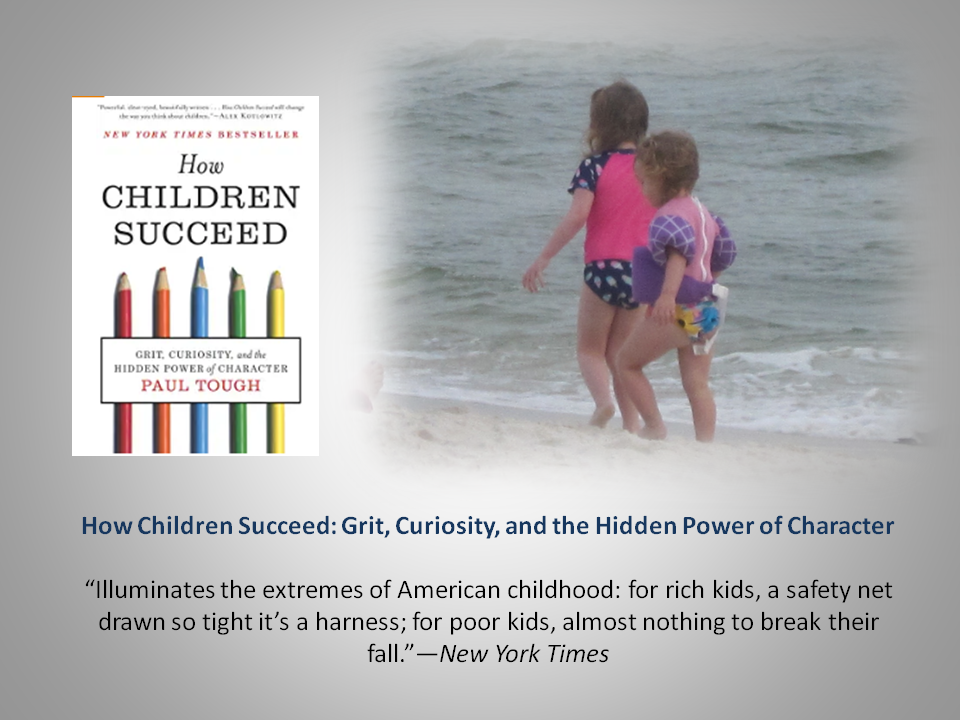Popular Opinion on How Children Succeed Has Changed Through the Years

When Paul Tough wrote “How Children Succeed,” people believed that improving a child’s cognitive skills would help create success. What parents and educators will learn from this book is a different concept. A person’s character has more to do with success and college graduation than being smart or being from a wealthy family with access to the best schools.
How do we define “Character?” When looking at how children succeed, we’re forced to acknowledge the research proves that non-cognitive skills far outweigh cognitive skills. They include persistence, self-control, curiosity, conscientiousness, grit, and self-confidence.
Some marvel at my ability to live above the harsh realities of my abuse as a child. I was one of the lucky ones. I had a nanny and a grandfather who impressed on me daily that I could do anything I set my mind to do. Back in the 50s as I looked at the prospect of college, I knew my biggest challenge was the fact I’d been born female. Even the college counselor told me I’d be considered “unhirable” if I attended for more than two years.
According to Kaiser Permanente and their Adverse Childhood Experiences Study (ACE) with a score of 5+, I didn’t have any of the qualities necessary to succeed in life. Thankfully, that study occurred after my college career ended. It would have convinced me I had no possibility of being anything other than what the college recommended for women: a teacher or a nurse.
That Was Then, But This is Now
According to Paul Tough, “It is in early childhood that our brains and bodies are most sensitive to the effects of stress and trauma. But it is in adolescence that the damage that stress inflicts on us can lead to the most serious and long-lasting problems.”
My abuse began when I was only seven-years-old. I’ll never know if anyone else knew or suspected what was happening to me. I was threatened not to tell, and quite frankly, I was too terrified even to attempt to cry for help. If Tough is correct, the problems exhibited themselves when I was a teen and tried to commit suicide. What I knew for sure at the moment I swallowed all the pills was that I didn’t want to live any longer. I felt inferior and tainted.
Now that I’m considered a senior citizen, I realize that everything Paul Tough outlined in his book is accurate. My grandfather and my nanny instilled in me a depth of character. It enabled me to survive and thrive under the most severe circumstances. They encouraged new activities and endeavors to challenge me and taught me how to try again when I failed. When I faltered, they taught me to have the grit to continue and never quit. I learned gratitude and self-control from the two of them.
Where my father failed miserably, and my mother fought the demons of bipolar illness, these two incredible individuals helped me become successful in life.
They taught me to have the willpower and to believe in myself. Thanks to Fannie and Grandpa, I found the courage to forge a different path to success.
The Humanity of Our Decisions Affects How Children Succeed
In my lifetime, I’ve never met two kinder people than Fanny Henderson and T.R. Burton. They helped develop my character and instill the grit necessary to succeed regardless of the roadblocks which kept appearing.
My college career ended abruptly when my father was unable to provide the funds for me to continue. Although I completed my freshman year, the lack of funds forced me to start working when I was nineteen.
I certainly wasn’t the smartest kid in my class, but I made a huge discovery shortly after I entered the workforce.
I watched the performance of young employees with new degrees closely. Their focus wasn’t as successful as mine when it came to dealing with our customers.
The knowledge they had that I lacked was the principles of business law, best accounting practices, and contract law.
What If?
So, what if I could save enough money to take one class per semester?
Could I ignore the English, math, and science and take the business courses that would give me the power to succeed paired with my on-the-job experience?
It took nearly six years for me to complete all the courses I believed were vital for me in the field of commercial credit. I was then able to sit for the Credit Business Fellow (CBF) testing of the National Association of Credit Management. The CBF is an academic and participation-based designation which illustrates that achievers are knowledgeable about and have contributed to the field of business credit. I may not have completed college. But, I competed in a man’s world successfully while mastering the area of business I was most interested in pursuing.
Looking back over all the years, I realize my success started with Fannie and Grandpa. They took me seriously and believed in my abilities. They constantly challenged me to believe in myself and to work hard. That made all the difference.
Success has more to do with resourcefulness, resilience, ambition, professionalism, and integrity than it does with an IQ test.
How Children Succeed by Paul Tough

The book How Children Succeed is relevant to every parent and most especially to those considering becoming parents. It provides insight into what characteristics are most prevalent in kids who find success in high school, college, and beyond. If this book is relevant to parents, anyone who participates in the teaching profession should read it.
Paul Tough shares case studies along with past and current research in an attempt to identify those attributes that predict the success of children as they become adults. Forget the SAT effect. These qualities have much more to do with future success than the scores on an intelligence test or a student’s financial status.
Learn from the remarkable stories of the kids no one thought could succeed. They were lucky to have teachers who saw the glimmer of an indomitable spirit not previously considered to be part of the foundation for success.
This book isn’t the golden ticket out of poverty. It is a study in many of the primary qualities that can change the outcomes. Isn’t that what we’re all looking for to help our children? Adjust your perspective, provide the opportunities, and above all give your child the courage to believe they can do better.
Stop asking how children succeed and become the mentor so many of these children desperately seek.